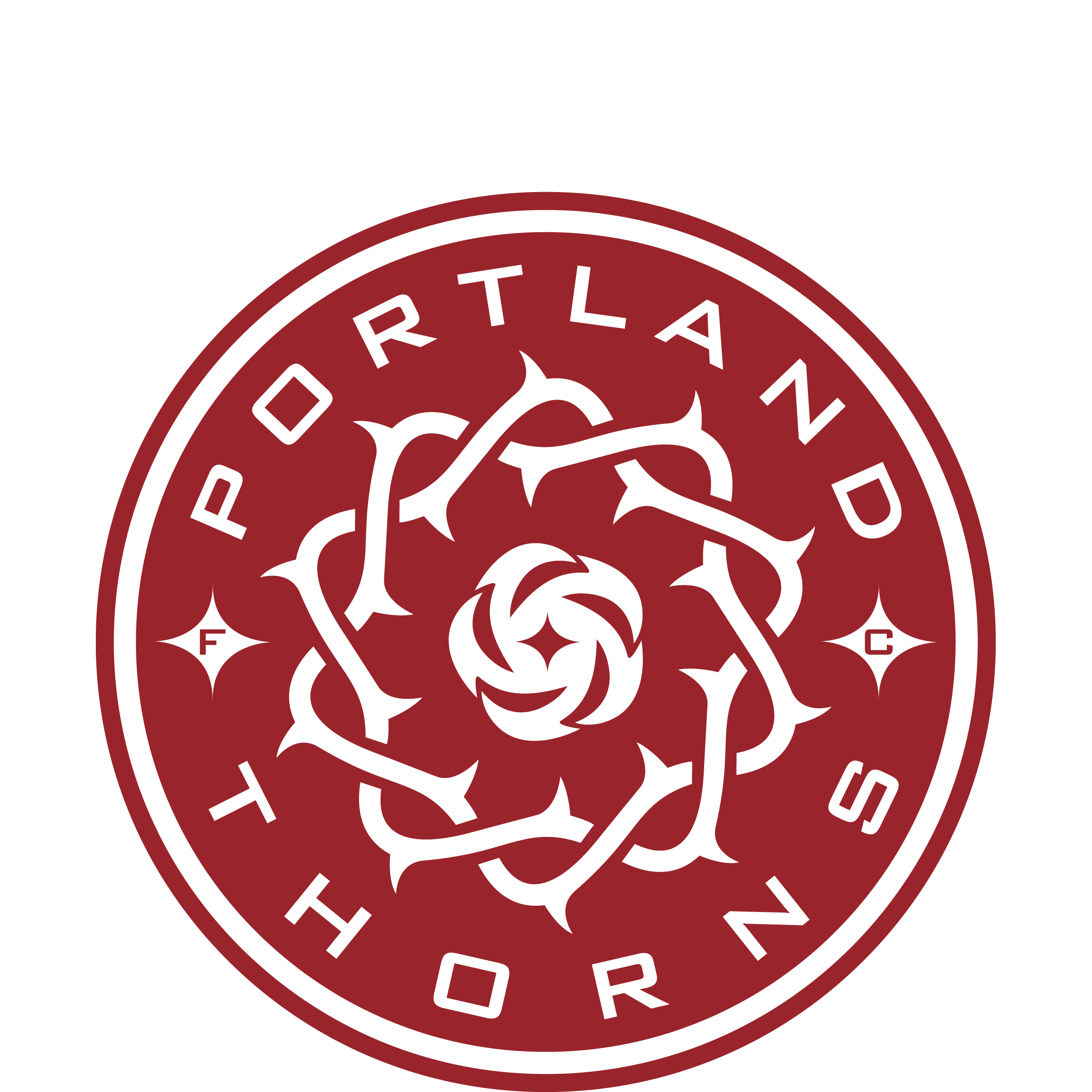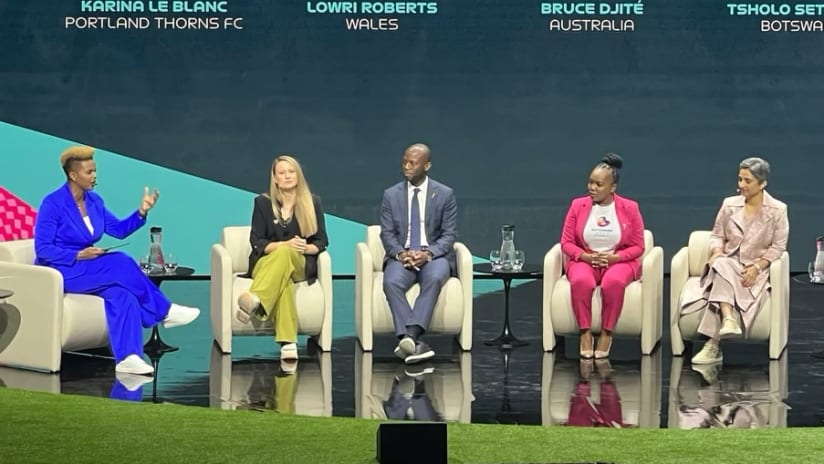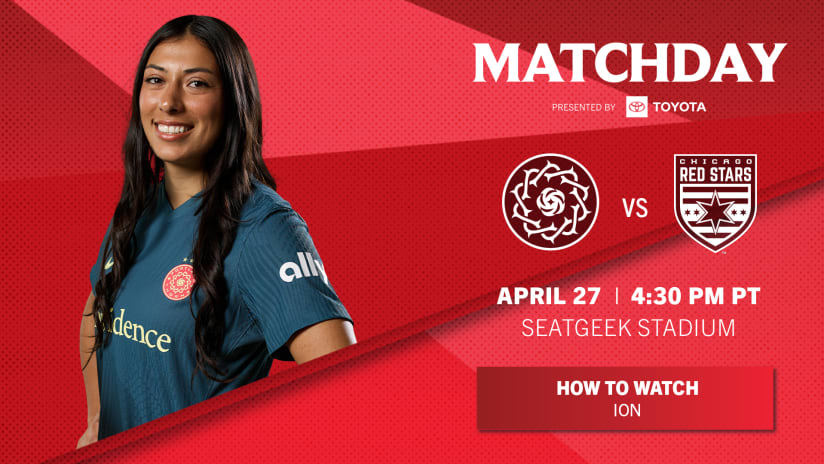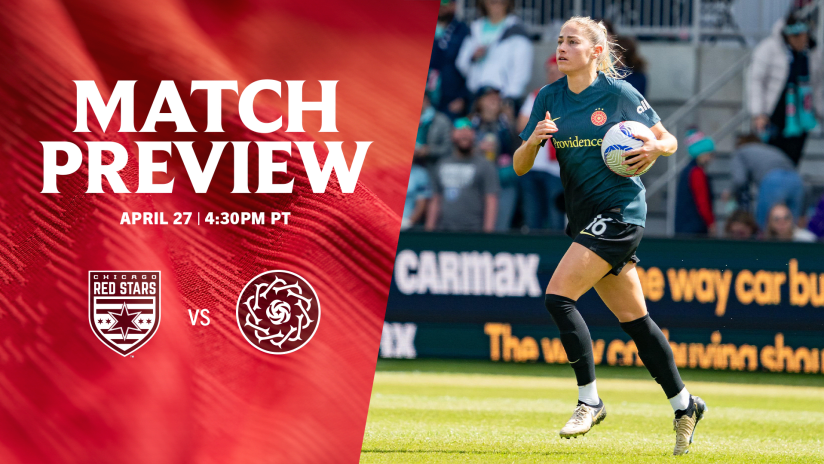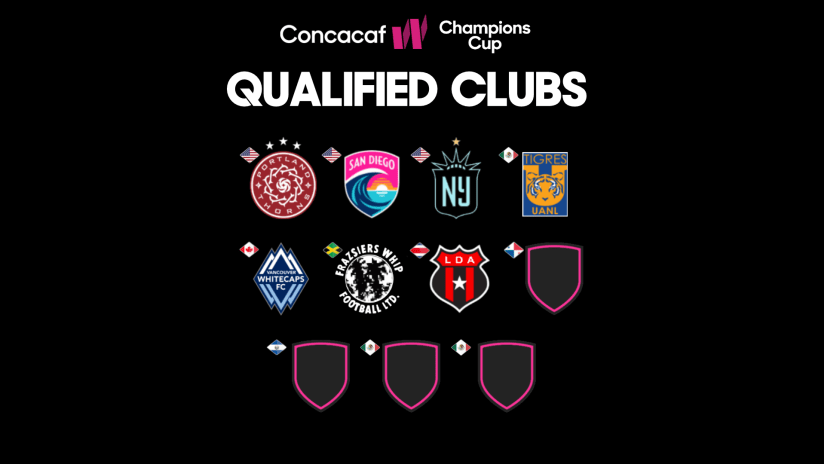When the 2023 Women’s World Cup kicked off on July 20, Portland Thorns FC fans could turn on their TV’s and see the club represented on several different national teams; the United States, Costa Rica, Canada and Japan all had at least one familiar face. But the five Portland players weren’t the only members of the organization to cross the Pacific Ocean. Behind the scenes, three members of the Thorns’ technical and front office staff were working on-site in Australia and New Zealand in a variety of roles.
Club General Manager and President of Operations Karina LeBlanc helped with FOX Sports’ coverage of the tournament as a studio analyst and spoke at and moderated a panel at the FIFA Summit. Portland’s Director of Goalkeeping, Nadine Angerer, was asked by FIFA to be one of two former international goalkeepers tasked with analyzing the evolution of the goalkeeper position. Director of Medical and Head Athletic Trainer Katie Donnelley worked with the U.S Women’s National Team on its sports medicine staff.
While no Thorn lifted the Women’s World Cup trophy, those behind the scenes considered the tournament a win in and of itself for the organization. Weeks removed from the end of the tournament, LeBlanc, Angerer and Donnelley point to several areas of personal growth when they reflect on their experience. They brought back new knowledge that they hope to implement day-to-day within the organization, but most importantly, their presence allowed the Thorns to keep its name in the conversation of women’s club soccer globally.
“We had three staff members in three different departments that have all now been at the highest stage in our industry,” Donnelley said. “That shows the strength of who we are as a club and what we bring on each different level from top down.”
Those who tuned into FOX Sports throughout the tournament may have caught a glimpse of LeBlanc in pre- or post-game coverage, providing analysis with her perspective as a former Canadian goalkeeper with plenty of international experience herself. LeBlanc has served as an analyst for both the Olympics and Women’s World Cup ever since her retirement, but this was her first time in the role since she took over in her position with the Thorns.
LeBlanc tackled topics such as “the art of goalkeeping” and helped break down the legacy of Brazilian star Marta, but her in-studio work was just the tip of the iceberg for what she did in Australia and New Zealand. Between TV segments, LeBlanc attended games, talked to agents, scouted some of the best players in the world in person and participated in the FIFA Summit, both as a speaker and moderator. Exposure wise, it was a great opportunity for her to do what she loves most: talk about the Thorns and share player’s stories.
“Getting the opportunity to see the players firsthand, see the games firsthand, getting to talk with agents and getting to speak about our club and the Portland name was key.” LeBlanc said. “The impact of this World Cup was massive, it was the biggest yet and many would agree, the best. Having the platform to speak on TV and on various panels about the incredible people that are in our game, speak on our club, what we are doing, and telling our story was an honor and privilege I don’t take lightly.”
Elsewhere in Australia, Angerer found herself spending countless hours in her hotel room. By the German’s estimations, she spent roughly nine or 10 hours a day throughout the tournament analyzing games with a focus on the goalkeepers, writing reports, participating in meetings and sharing her observations with FIFA. Angerer was one of two members of the panel, alongside former Swiss goalkeeper Pascal Zuberbühler, tasked with finding new trends with the goalkeeper position and tracking how the position has evolved.
“It was an amazing opportunity for my own growth,” Angerer said. “I got to see the world’s best goalkeepers, find new trends and, of course, bring this new knowledge to our goalkeeper work in Portland.”
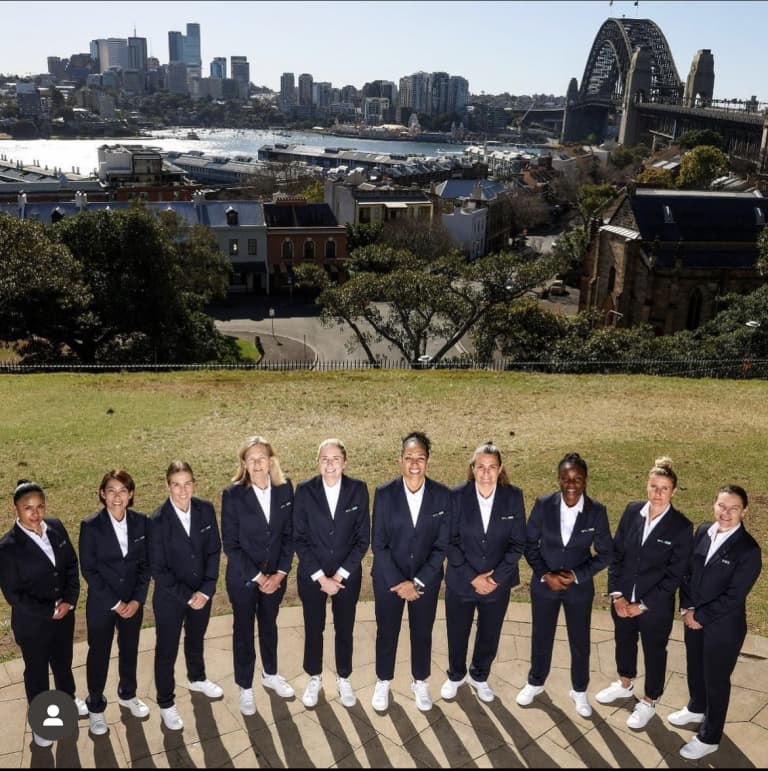
Angerer pointed out several trends in today’s goalkeeper game she picked up on during her countless hours spent watching film. For example: she noted how goalkeepers have improved their positioning on corner kicks and crosses, commenting that those who play the position today are more brave and ruthless with their timing. Additionally, she found that goalkeepers are more connected with their teams than ever thanks to the emphasis some programs, such as World Champion Spain, have put on building out of the back.
Throughout the tournament, Angerer sent clips of some of the world’s best goalkeepers paired with some of her own observations to Bella Bixby, Shelby Hogan and Lauren Kozal. She encouraged them to watch the games of certain players, all with different strengths, and pay attention to how they play.
“It was nice to show them where we can improve and get better,” Angerer said, “And I also wanted to show them examples where we are already better than other goalkeepers.”
Donnelley, the third staff member in the South Pacific, worked on the sports medicine staff for the U.S women’s national team where some of her responsibilities included assisting with the direct treatment of the athletes, rehabilitation and pre-training activation. 2023 served as Donnelley’s second Women’s World Cup as she received her national team “call-up” back in 2014.
While an incredible opportunity both personally and professionally, being on-site in Australia and New Zealand didn’t equate to time off from the organization. The three still had daily responsibilities with the Thorns as the club continued to play games thousands of miles away. Scheduling and executing online staff meetings wasn’t made any easier by the difference in time zones, which at best was a 15-hour difference in Perth, Australia, and at worst a 19-hour difference in Auckland, New Zealand.
“I don’t want to lie, I was tired,” Angerer said. “But it was okay because a World Cup is every four years and sometimes you have to sacrifice things. If you see how much I learned and what I could take away from this tournament, it was absolutely worth the lack of sleep for six weeks.”
The drastic time change did offer a bright spot. LeBlanc could scout in person and hear feedback from those in Portland streaming those games at home. Angerer could tune into a Thorns match before shifting her attention to analyzing tournament games.
Donnelley talked about putting a lot of trust into the rest of the athletic training team back in Portland. She still had weekly staff meetings to check in on player recoveries and fielded calls from players, but she knew she could afford to take a relatively hands-off approach with day-to-day tasks thanks to her team.
“I have to give credit to the staff,” LeBlanc said. “They were able to keep things in Portland at a high level.”
The trust level in the club’s staff back home freed those in Australia and New Zealand to shift their attention to making the most of the Women’s World Cup experience.
As LeBlanc mentioned, the networking she did and her ability to remain around the newest discussions in women’s club soccer would have been impossible had she been in Portland watching the games remotely.
Angerer, meanwhile, attended games between France and Jamaica; Canada and Ireland; and Australia and Ireland; leaving her with ideas of where she wants to see the Thorns goalkeeper group improve. She even found a few minutes to chat with Christine Sinclair after a game.
On the medical side, Donnelley returned to Portland with more experience working in an intense environment. There isn’t time for something like a soft-rehab in a knockout competition, such as the Women’s World Cup, and every decision made by the sports medicine team carries much more weight than in the club game. Already managing in a high-stakes knockout-tournament experience from a medical perspective should certainly help back home with the NWSL playoffs rapidly approaching.
“I think one of the things I have really grown into with the U.S. team are those high expectations,” Donnelley said. “That world-class care and environment where everything has to happen a little bit faster.”
For just over a month, as Thorns players competed on the field, staff members worked tirelessly off it to build experiences and gain new knowledge that they’ve brought back to the Rose City. In that sense, the 2023 Women’s World Cup was a success and a tournament that played just as crucial a role for the organization off the field as it did on it.
